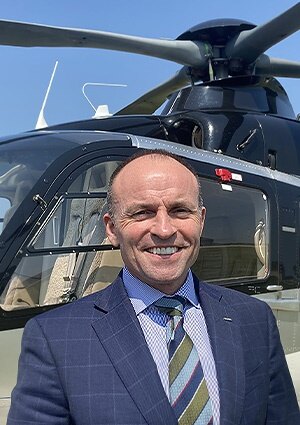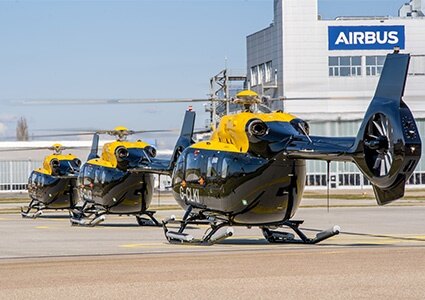
Airbus Helicopters: A Legacy of Aerial Innovation
Aviation industry giant Airbus Helicopters has gained recognition throughout its decades-long existence, earning its position as a global leader in the sector. A division of Airbus, the industry powerhouse in aeronautics, space and related services, Airbus Helicopters is renowned for its dominant market share outside the USA and increasingly for its spearheading of sustainable technology and operations. With a presence spanning over 150 countries, Airbus’ helicopters are a lifeline for those who serve, protect, and save lives, while remaining the trusted choice for safely carrying passengers in demanding environments. From civil and government operations to military, law enforcement, and public service, the company offers the full spectrum of rotary-wing aircraft solutions. Lenny Brown, Managing Director of Airbus Helicopters UK, provides a comprehensive account of the company’s journey and evolution in the UK.

Support solutions
First established in 1974 as McAlpine Helicopters, the company became Eurocopter when Airbus fully acquired that company in 2007 and was renamed Airbus Helicopters UK in 2014. Its headquarters and primary facility are based at Oxford Airport eight miles north of the city. Lenny relates: “About two-thirds of our workforce, which comprises 450 talented individuals in total, is here at Oxford with most of the remainder at RAF Shawbury, where they support the UK’s Military Flying Training System (MFTS). That role involves training the country’s military rotary-wing pilots and crew members on our helicopters. Additionally, we have an adjunct of the MFTS based at RAF Valley, where they focus on search and rescue training, and small units within the Police Service of Northern Ireland and a logistics department supporting the oil and gas industry on their H175 helicopters in Aberdeen.”
The final element of the workforce is an engineering detachment at RAF Benson supporting the RAF’s Airbus Puma HC2 helicopters. The Pumas are due to be taken out of service and the MoD is expected shortly to launch a competition to replace them under the New Military Helicopter (NMH) program – it could have dramatic consequences for the company. Lenny says: “Our goal is to bid for the contract to replace the 23 Puma helicopters that we currently support. We’ll be up against giants like Lockheed Martin, so, we have formed strategic partnerships with Boeing, Spirit AeroSystems and Babcock International to stand us in good stead.
Complex configurations
“If we are selected, we will produce our candidate helicopter – the H175M – at a brand new facility at the existing Airbus wing-building plant at Broughton in North Wales. It has incredible potential to reinvigorate the UK’s underperforming helicopter industry.”
Lenny details the current capabilities in the UK, which have led to the company’s enviable market position. “It is important to note that we don’t produce helicopters at our Oxford facility,” he explains. “The aircraft are delivered to us from Airbus factories in France and Germany and we then apply the mission systems, avionics, upholstery and so on depending on the end customer’s specification. In other words, we act as a customization shop. We employ over 40 aircraft design engineers who can design pretty much anything we require in or on the aircraft. That covers our VIP, military, air ambulance, and police helicopters – some of which have highly complex configurations, which are our speciality.
“Our team of engineers is digitally connected with the wider Airbus Helicopters design team in France and Germany, which empowers all teams to share data on designs. The designers focus on developing the aircraft customizations and then the installation engineers put those designs on the aircraft. A great example of that process is on the H130 helicopter we’re currently working on in association with Aston Martin under our Airbus Corporate Helicopters brand – christened the ACH130 Aston Martin Edition. The interiors are all handstitched leather and completed with sublime paintwork from Aston Martin’s range of auto paint finishes. It’s been extremely popular in the market, and we have performed 17 of those which are shipped across the world from the UK.”
Lenny describes how another key capability is in meeting the requirements of the National Police Air Service (NPAS) in the UK. This entails fitting aircraft with a range of surveillance systems, and rear operator suites, as well as handling communications and data uplink/downlink capabilities. NPAS is also a major customer for the company’s maintenance, repair and overhaul (MRO) operation which handles 70-to-90 aircraft per year.
 Commitment to carbon reduction
Commitment to carbon reduction
Airbus Helicopters has a crucial role to play in recruiting and training future generations of helicopter aircrew and engineers in the UK – partly for its own employment needs and partly as an industry partner to the Military Flying Training System which exclusively uses Airbus helicopters – the H135 Juno and H145 Jupiter. Lenny says: “Within the wider Airbus group, we train nearly 900 apprentices in the UK. Our own program is just one part of that, but it is growing and now includes not only engineering apprenticeships but also those in design, sales, HR and soon, executive PA. Airbus Helicopters is a very attractive company to work for as we provide apprentices with the opportunity to acquire formal academic and licensed qualifications. So at the end of their training, apprentices tend to stay within our organization.
“As well as the MFTS operation we also train all the RAF Puma engineers plus pilots and customers who have purchased our aircraft, equipping them with the necessary skills to fly and debrief their maintenance teams. And in our flight department we have our own test pilots who closely collaborate with the design team, ensuring that any new design products, customizations, and aircraft modifications undergo rigorous certification and testing.”
For evidence of the company’s belief in its own ambition you need only look at the state-of-the-art new HQ and production facility now near completion on the other side of Oxford Airport from its outdated current base. Delayed by the Covid-19 pandemic, the 12,000 meter-squared unit, financed by Airbus itself, will open in June 2024 coinciding with the UK company’s 50th anniversary.
The facility will greatly increase industrial capacity, transform working conditions and ensure safe aviation operations but Lenny explains that a key benefit will be a reduction in carbon emissions of around 50 percent – fully in-line with Airbus’ global commitment to sustainability. He says: “This commitment to world-class sustainability is enshrined in our corporate goals today and our customers want to see us taking this path.
“The new base is a huge step in that direction but we’re also well on our way to using sustainable aviation fuel (SAF) for all our flight operations here. It will be a blend for now but is pioneering activity and we’ve already demonstrated that 100 percent SAF is usable in our helicopters when we get all the necessary approvals. It will cost more but we anticipate that as economies of scale come into play, the cost will come down. We’re also looking at a solar farm for the new base and we’re moving to electric and hybrid vehicles in our company vehicle fleets as fast as we can.”
Through its expertise in engineering excellence, Airbus Helicopters has secured itself a prosperous future. From what Lenny has shared, Airbus Helicopters’ dedication to quality customer service and keen eye for innovation, continues to make it a dependable name in the aerospace industry.